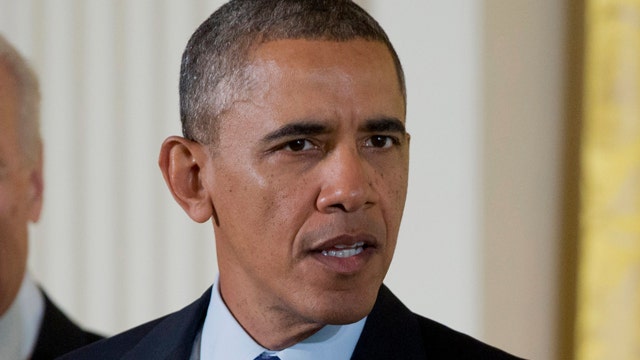Fox News Poll: Income inequality not the government's job
Disconnect between the American people and President Obama?
President Obama relentlessly argues the unemployed lack work through no fault of their own, and Republican reluctance to reinstate long-term jobless benefits is both heartless and harmful to the economy. Those assertions contradict the facts and sound economics.
Last July, North Carolina cut maximum unemployment benefits from 73 weeks to 20. Over the next five months, its unemployment rate fell from 8.8 percent to 7.4 percent—more than four-times better than the progress registered at the national level.
Eliminating the subsidy for not working inspired many Tar Heels to more earnestly seek jobs and accept positions they had previously shunned. Many others who lost benefits dropped out of the state labor force altogether, indicating they neither needed jobs nor unemployment benefits to get along, or they pulled up stakes and moved to places like South Dakota where good jobs go begging.
When liberal newspapers or NPR run stories about Republicans in Congress blocking federal subsidies for yet another round of unemployment benefits beyond the customary 20 to 26 weeks, they recount women hocking grandmother’s wedding rings and fathers selling children’s bicycles to pay rent or purchase groceries.
No doubt those individual anecdotes are true, however, in North Carolina, after the legislature cut off long-term benefits, those media did not document additional thousands applying for public assistance, crowding homeless shelters or stressing food banks. It would appear many who had lost those payments had assets other than family heirlooms and children’s treasures to sustain them, such as a spouse with a decent job or a large retirement account.
State unemployment insurance programs require beneficiaries to document they are actively looking for work, but those can’t compel the unemployed to be earnest, relocate or accept positions at significantly lower pay or status than their old positions. Excessively long eligibility periods for unemployment benefits do encourage the jobless to put off reconciling with harsh facts of their changing circumstances. It is not clear why a taxpaying waitress should subsidize a displaced executive who does not want to drive a cab.
Similarly, those benefits help explain why so many tough jobs at meat packing plants and cleaning offices go to immigrants. Native born Americans act as if some jobs are beneath their dignity, but it is wholly unfair to tax immigrants and others to pay for such behavior.
Focusing on the broader economy, Democrats argue that extending unemployment benefits provide the most effective economic stimulus for the slow growing economy, because the unemployed spend that money quickly. However, that assumes other federal programs are not cut or taxes raised to pay for the program. In the current federal budgetary environment, deficit spending to finance extended jobless benefits is simply not on the table, invalidating the stimulus argument.
Increasing the duration of unemployment benefits also reduces the demand for workers. Simply, those benefits encourage the unemployed to hold out for higher wages, and require employers to pay more for new workers and those already on the payroll. Much like a higher minimum wage, that phenomenon causes employers to post fewer job openings.
Researchers at the non-partisan National Bureau of Economic Research compared labor markets in states and counties with longer and shorter maximum periods for unemployment benefits and found this phenomenon significantly reduces employment. In fact, they found extended unemployment benefits caused most of the persistently high unemployment after the Great Recession. Put another way, those benefits actually hurt the unemployed by substantially curtailing the creation of new job opportunities.
The weight of evidence indicates that extending long-term unemployment benefits helps neither the overall economy nor the unemployed. To argue otherwise is simply to be blind to facts and deaf to reason.

